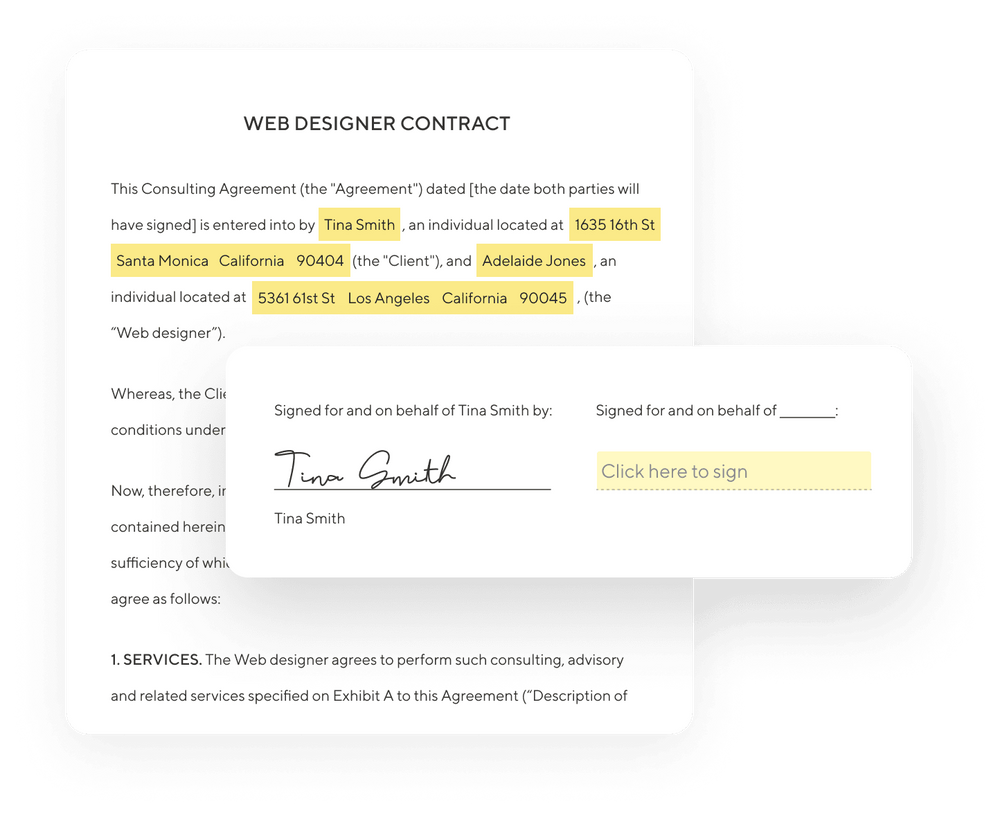Running a small business comes with its fair share of challenges, and one of the most crucial aspects is ensuring you have a solid business contract in place. With the alarming statistics related to small business lawsuits, it's evident that proper business contracts protect you and are more important than ever.
Here are a few eye-opening small business lawsuit statistics:
- Every year, small businesses are sued to a range of 36% to 53% according to the Small Business Administration (SBA).
- 43% of small businesses have been threatened with a lawsuit.
- Each case could cost up to $150,000, especially if it goes to trial.
- At some point in their lifespan, 90% of all businesses face lawsuits.
In this article, we'll guide you through the process of writing a winning small business contract and provide you with a template to help you get started. Let's dive into the main divisions of a small business contract first.
Main Divisions of a Small Business Contract
The Parties to the Contract
When drafting a contract, it's essential to clearly define the parties involved. This section should include the full legal names and contact information of the parties, as well as any relevant business or tax identification numbers. You may also want to add a brief description of each party's role in the business relationship.
The Goods or Services to Be Exchanged
In this section, provide a detailed description of the goods or services being exchanged. Be as specific as possible, and include any unique aspects, such as product features, quantities, or specialized services. This helps to avoid confusion and potential disputes down the line.
The Price
Clearly outline the price or compensation for the goods or services being provided. This may include a lump sum, hourly rate, or other payment structures. Make sure to specify the currency and any applicable taxes or fees.
The Payment Terms
Payment terms are a critical aspect of any business contract. This section should outline when and how payments will be made, as well as any penalties for late payments or incentives for early payments. Be sure to include information on acceptable payment methods and any payment milestones or schedules.
The Delivery Date
Clearly define the expected delivery date or time frame for the completion of the goods or services being provided. This ensures that both parties have a mutual understanding of when the work is to be completed and helps to avoid potential disputes.
The Warranty
If applicable, include a warranty section that outlines the terms and conditions of any guarantees provided for the goods or services. This may include the duration of the warranty, the scope of coverage, and any limitations or exclusions.
The Dispute Resolution Clause
In the event of a disagreement, a dispute resolution clause outlines how the two parties together will resolve any issues. This may include negotiation, mediation, arbitration, or litigation. Specifying a dispute resolution method in advance can save time and money should a disagreement arise.
Keys for Writing a Solid Contract
Clarity Is King
When drafting your contract, prioritize clarity and conciseness. Avoid using complex language or jargon that might lead to misunderstandings. It's essential that both parties can easily understand the terms of the agreement.
Specificity Matters
Be specific about the terms and conditions of your contract. Vague or ambiguous language can lead to confusion and disputes down the line. Make sure to cover all the details, from payment terms to the scope of work, to ensure a smooth business relationship.
Fairness First
A fair business contract ensures it benefits both parties and sets the stage for a successful collaboration. Be reasonable when setting terms, and avoid any conditions that would unfairly disadvantage one party. A fair contract establishes trust and goodwill, which are essential for long-lasting business relationships.
Embrace Negotiation
Be prepared to negotiate the terms of your new contract beforehand. Both parties should feel comfortable with the agreement, and negotiation can help to achieve a mutually beneficial outcome. Keep an open mind and be willing to compromise when necessary to reach an agreement that satisfies both parties' needs.
Seek Legal Advice
While drafting a contract may seem straightforward, it's always a good idea to consult with a legal professional. An attorney can help ensure that your contract is legally sound, complies with local laws, and protects your interests. Additionally, they can provide guidance on any specific clauses or terms that may be relevant to your particular situation.
How to Write a Small Business Contract: Step-by-Step
Use a Template
Leverage contract templates to save time and ensure your document includes all the necessary components. There are many free contract document templates available online, or you can use a platform like Indy that offers a variety of customizable templates tailored to various industries and business needs.
Fill in the Blanks
Once you've selected a template, carefully fill in the relevant details for your specific business arrangement. This includes the names and contact information for the parties involved, a detailed description of the goods or services being exchanged, payment details, and any other pertinent information.
Review the Contract Carefully
Before finalizing your contract, thoroughly review the document to ensure that it accurately reflects your agreement and that there are no errors or inconsistencies. Make sure that all necessary sections are included, and that the language is clear and concise.
Get Legal Advice
As mentioned earlier, it's always a good idea to seek legal advice when drafting a business contract. An attorney can review your contract, identify potential issues, and provide guidance on any necessary revisions or additions.
Small Business Contract Template
[Party 1's Full Legal Name]
[Party 1's Business Name, if applicable]
[Party 1's Address]
[Party 1's Contact Information]
[Party 2's Full Legal Name]
[Party 2's Business Name, if applicable]
[Party 2's Address]
[Party 2's Contact Information]
This Business Contract (the "Agreement") is entered into as of [Date], by and between [Party 1's Full Legal Name] ("Party 1") and [Party 2's Full Legal Name] ("Party 2"), collectively referred to as the "Parties."
Goods or Services
Party 1 agrees to provide Party 2 with the following goods/services:
[Detailed Description of Goods or Services]
Price
The total price for the goods/services provided under this Agreement shall be [Price]. This amount includes all applicable taxes and fees.
Payment Terms
Payment shall be made as follows:
[Payment Structure, Payment Schedule, Late Payment Penalties, etc.]
Delivery Date
The goods/services shall be completed/delivered by [Delivery Date or Time Frame].
Warranty
[If applicable, outline the terms and conditions of the service agreement and any warranties provided for the goods/services]
Dispute Resolution
In the event of a dispute arising from this Agreement, the Parties agree to [Dispute Resolution Method].
Termination
This Agreement may be terminated by either Party upon [Notice Period] written notice to the other Party if [Conditions for Termination].
Confidentiality
Both Parties agree to maintain the confidentiality of any information marked as confidential or that reasonably should be considered confidential under the circumstances. The Parties shall not disclose such information to any third party without the prior written consent of the other Party.
Intellectual Property Rights
[Outline ownership of intellectual property rights, licensing agreements, and usage rights]
Indemnification
Each Party agrees to indemnify and hold harmless the other Party from and against any and all claims, damages, or expenses (including reasonable attorney's fees) arising from any breach of this Agreement or the negligence or misconduct of the indemnifying Party.
Force Majeure
Neither Party shall be liable for any delay or failure to perform its obligations under this Agreement due to circumstances beyond its reasonable control, including but not limited to acts of God, natural disasters, pandemics, or civil unrest.
Governing Law and Jurisdiction
This Agreement shall be governed by and construed in accordance with the laws of [State/Province/Country]. Any disputes arising from this Agreement shall be resolved exclusively in the courts of [State/Province/Country].
Counterparts and Signatures
This Agreement may be executed in any number of counterparts, each of which shall be deemed an original and all of which together shall constitute one and the same instrument. The Parties agree that electronic signatures shall be considered valid and legally binding.
Entire Agreement and Amendment
This Agreement constitutes the entire understanding between the Parties and supersedes any prior agreements or understandings, whether written or oral. This Agreement may be amended only by a written document signed by both Parties.
Acceptance and Acknowledgment
By signing below, both Parties acknowledge that they have read, understood, and agree to be bound by the terms and conditions set forth in this Agreement.
[Party 1's Full Legal Name]
By: __________________________
Name: ________________________
Title: _________________________
Date: _________________________
[Party 2's Full Legal Name]
By: __________________________
Name: ________________________
Title: _________________________
Date: _________________________
Additional Clauses and Provisions
Depending on the nature of your small business, you may want to include additional clauses or provisions in your contract. Some examples include:
Non-Competition Clause
This clause prohibits one party from engaging in business activities that compete with the other party within a specified geographical area and time frame.
Non-Solicitation Clause
This clause prevents one party from soliciting the other party's employees or customers, usually for a set period after the termination of the contract.
Independent Contractor Relationship
If the contract is for a service provider, it's essential to clarify that the relationship is an independent contractor, not an employee. This can help avoid any potential legal issues related to employment taxes, benefits, or worker's compensation.
Change Orders
This provision outlines the process for making changes to legally binding contract regarding the scope of work, price, or delivery date. It's essential to have a clear process for requesting, approving, and documenting any changes to the original contract.
Liability Limitations
Include a clause limiting the liability of one or both parties in the event of damages or loss resulting from the performance of the contract. This helps protect the parties from undue financial burdens if something goes wrong.
Severability
This clause states that if any part of the contract is found to be unenforceable or illegal, the remaining provisions will still be valid and enforceable.
Notices
Outline the method and address for sending any notices or communications related to the contract, such as termination notices or change requests.
Leveraging Indy's Contracts Tool for Your Small Business
Indy's Contracts tool is a valuable resource for small business owners looking to create professional, legally sound contracts without the hassle of starting from scratch. With a variety of customizable templates tailored to various industries and business needs, the Contracts tool makes drafting, sending, and signing professional contracts almost a breeze. Here's how you can benefit from using Indy's Contracts tool:
Access to Industry-Specific Templates
Indy's Contracts tool offers an extensive library of industry-specific templates, helping you find the perfect starting point for your contract. Whether you're a freelancer, consultant, or small business owner, you'll find a template that suits your needs and complies with the relevant legal requirements.
Easy Customization
With Indy's intuitive interface, you can easily customize contract templates to fit your specific business arrangement. Simply fill in the required details, and the Contracts tool will generate a professional, legally compliant document that is easy to customize and accurately reflects your agreement.
Secure E-Signing
Indy's Contracts tool features a built-in e-signing functionality, allowing you and your clients or partners to sign contracts securely and efficiently. This eliminates the need for printing, scanning, and mailing physical documents, streamlining the entire contracting process.
Contract Management and Storage
Keep track of your contracts with Indy's built-in contract management features. You can easily access, organize, and store all your contracts in one place, ensuring you never lose track of important documents or deadlines.
Collaboration and Communication
The Contracts tool enables seamless collaboration and communication between you and your clients or partners. You can share contracts, request revisions, and receive notifications when contracts are signed, all within the Indy platform.
To start using Indy's Contracts tool, simply create an account, select the appropriate contract template, and begin customizing it to suit your specific business needs. With the Contracts tool at your disposal, you can save time and resources while protecting your small business interests.
Frequently Asked Contract Questions
What is the importance of a written contract?
A written contract is crucial because it outlines the terms and conditions of a business arrangement, reducing the risk of misunderstandings and disputes. It serves as a legally binding document that can be enforced in court if necessary, providing protection for both parties involved.
How do I make a contract legally binding?
A contract becomes a legally binding agreement when it includes an offer, acceptance, consideration (something of value exchanged), intention to create legal relations, and the legal capacity of all parties. Ensure that the contract clearly outlines the agreed-upon terms and conditions, and is signed by all parties involved.
What happens if a contract is breached?
If a contract is breached, the non-breaching party may pursue legal remedies, such as suing for damages, specific performance (requiring the breaching party to fulfill their obligations), or contract termination. The appropriate remedy depends on the nature and severity of the breach and the contract's terms.
Can a contract be changed after signing?
Yes, a contract can be changed after signing through a process called contract amendment. Both parties must mutually agree to the changes and sign an amendment document that outlines the modifications. The original contract remains in effect, with the amendment serving as a supplementary, binding agreement.
What is an NDA and when is it necessary?
A Non-Disclosure Agreement (NDA) is a legal contract that protects confidential information shared between parties. It's necessary when sensitive information, such as trade secrets, financial data, or proprietary processes, must be disclosed during business negotiations, partnerships, or employee onboarding to prevent unauthorized sharing or use.
What is the difference between an independent contractor and an employee?
An independent contractor is a self-employed individual who provides services to clients under a contract, has control over their work, and is responsible for their own taxes and benefits. An employee works under the direct supervision of an employer, receives a regular salary, and is entitled to employment benefits and protections.
Can contracts have an expiration date?
Yes, contracts can have an expiration date, typically referred to as the "term" of the agreement. The term specifies the duration for which the contract is valid, and upon reaching the expiration date, the contract automatically terminates unless both parties agree to extend or renew it.
Conclusion
In conclusion, creating a winning small business contract is crucial to protecting your business interests and ensuring a successful relationship with your clients or partners. By following the guidelines and using the template provided, you can develop a comprehensive and legally sound contract that covers all the necessary aspects of your agreement.
Remember to prioritize clarity, specificity, and fairness when drafting your contract, and always seek legal advice to ensure your document complies with local laws and regulations. By taking these steps, you can help reduce the risk of disputes and create a solid foundation for your small business relationships.
To get started quickly, check out Indy's Contracts tool page. You can find many helpful business contracts and business contract templates to jump start your next legal agreement.




